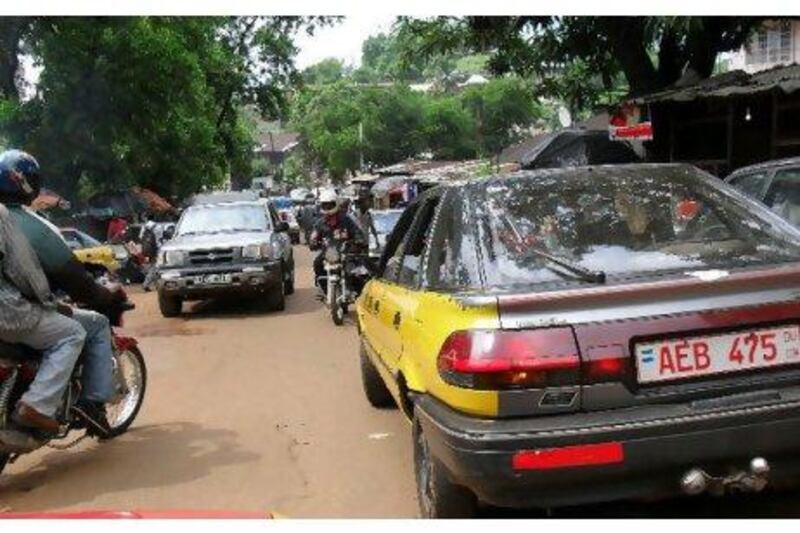When my Scottish-born grandfather, John Archibald Mackenzie Rillie, heard that he was being posted to Sierra Leone in West Africa, it was August 6, 1940, and the Second World War had been raging for almost a year. A member of the Royal Army Medical Corps (RAMC), Jack - as he was more commonly known - recorded the moment in his diary with great unease.
"We … were on 'stand-by' on the gun and heard for the first-time our destination. He was an Aberdonian and in the broad lilting highland dialect he gave us to understand that Hell was a pleasure resort in comparison with Sierra Leone … We all knew and were shocked. Sierra Leone was our destination."
Some seven decades after Jack's own 18-month military "sojourn" in the country's capital, with his diary in hand, I too was making my way to this coastal Atlantic nation of just 5.7 million. Excited about the prospect of following in Jack's footsteps, I was, nevertheless, only privy to a few known facts about the country: that Jack and his comrades were sent to protect this nation which then served as a British dominion; that the brutal civil war of 1991-2002 between the notorious Revolutionary United Front (RUF) and the government claimed tens of thousands of lives, fracturing its once-thriving tourist scene. In 2008, for instance, only a paltry 3,842 overseas visitors vacationed in the country.
When I touch down at Lungi International Airport, it is hot and humid, and a 10-minute helicopter ride later I arrive in the city (a helicopter, water taxi or ferry is required to get from the airport to Freetown, the capital, both of which are separated by the Sierra Leone River).
The country is in the last throes of the rainy season and, when I finally arrive in the city itelf, I'm immediately struck by the greenery of my surroundings. The air is heavy from the previous night's downpour, but from my vantage point on Wilberforce in the city's west-end - one of Jack's old military haunts, where I am staying with two expat friends - I have a sweeping view of the coastal reaches of the city below. A gentle mist hangs over the capital, crowning an undoubtedly beautiful scene.
To make inroads into Freetown, a city of 1.2 million, I secure the services of Mohammed, a taxi driver arranged through one of my expat hosts. He agrees to charter out his vehicle as and when I require. In Freetown, taxis are used on a route basis - where people hop on and off like buses - but unfamiliar with the city and eager to get to particular landmarks, I agree to a rate of 15,000 leones an hour (US$3.50, Dh13), the standard rate for chartering out a driver in the capital.
From Wilberforce, and with Jack's diary acting as a partial city guide, Mohammed's bashed-up Toyota struggles to negotiate the atrocious network of roads which, narrow and pot-holed, wind down towards the city itself. Wild dogs, many hobbling from past run-ins with the city's sprawling number of cars, motorbikes and minibuses, roam the streets with harmless familiarity as local women carry wares on their heads and wash in small street-side waterfalls.
The city's east end is one of my first ports of call and, as we make our approach, Freetown's town centre opens up into a frantic jumble of sights, sounds and smells that appall and delight in equal measure. Street names - gloriously titled Kissy Road, Newcastle Street, Regent Street and the like - scream at Sierra Leone's past as a former British colony (it gained its independence in 1961) as young men - many proudly decked out in Manchester United, Chelsea and Barcelona shirts - peddle a bizarre array of goods (tins of roast beef, giant padlocks and games of Monopoly) to passing motorists, mind small shopping outlets or aimlessly wander around the city's chaotic network of thoroughfares, lanes and avenues.
Looking around, there are Arab faces and voices in abundance. Indeed, the country's not insignificant Lebanese population (Lebanese migration to Sierra Leone began around 1895) has made a real mark in the business community. Today, they run a number of the better-known restaurants, not least Mamba Point on Regent Road, a quality eatery and hotel that regularly attracts the city's expat community and does everything from pizza to sushi. Indeed, restaurants are plentiful here, and a visit to the Bamboo Hut on Wilkinson Road is worth it if only for a taste of its home-brewed (and exceedingly spicy) ginger beer.
With my tour of the capital over, I spend much of the time mulling over my trip as I head for home, not least as I make my way back towards Lungi on the 40-minute water taxi. Freetown - its beauty aside - is hard going. Your arrival at the airport where you are almost set upon is unwelcome (as is the prospect of having to get another mode of transport to get to the other side) and, once you've made several tours of the city itself, its claustrophobic-like atmosphere begins to grate. Freetown is almost more big town than city. While the people are friendly and, despite largely living hand-to-mouth, optimistic and approachable, they are quite clearly not used to the sight of many foreign visitors. Sierra Leone may have come a long way since the war ended in 2002 - unlike Beirut's many bullet-ridden districts, for instance, you would hardly know that any such upheaval occurred. But, as far as its capital is concerned, it is, for now at least, one of the world's still undiscovered destinations.





